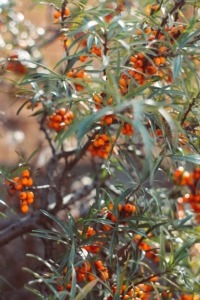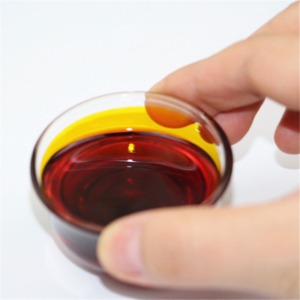Psoriasis is a common skin systemic inflammatory disease leading to the development of dermal changes such as itching, burning, and soreness. During the onset of the disease, the affected keratinocytes and pro-inflammatory immune cells cross-talk to release soluble pro-inflammatory mediators such as IL-1β, TNF-α, IL-6, and IL-8. So far, there is no permanent cure for psoriasis, and the disease can undergo cyclic evolution with periods of flaring for weeks or months, and then becoming dormant for a significant amount of time.
Sea buckthorn oil has been used as a good source of nutrition for centuries, with defined medicinal uses like cardioprotective, antidiabetic,  hepatoprotective, and anti-carcinogenic activities. Sea buckthorn oil extracted from the fruit pulp shows anti-inflammatory and anti-psoriatic roles. This oil contains high quantities of saturated, monounsaturated, and polyunsaturated fatty acids along with smaller factions of several other fatty acids. Fatty acids such as palmitic acid, oleic acid, palmitoleic acid, stearic acid, and linoleic acid in sea buckthorn oil act as major constituents of the human epidermis.
hepatoprotective, and anti-carcinogenic activities. Sea buckthorn oil extracted from the fruit pulp shows anti-inflammatory and anti-psoriatic roles. This oil contains high quantities of saturated, monounsaturated, and polyunsaturated fatty acids along with smaller factions of several other fatty acids. Fatty acids such as palmitic acid, oleic acid, palmitoleic acid, stearic acid, and linoleic acid in sea buckthorn oil act as major constituents of the human epidermis.
- Palmitoleic acid also promotes wound healing and diminishes inflammation through the modulation of pro-inflammatory cytokines.
- Omega-3 (α-linolenic acid) and omega-6 (linoleic acids) fatty acids present in sea buckthorn oil are essential components of the body and help in the translocation of the fat-soluble vitamins (A, D, E, and K) and wound healing.
- Omega-3 (α-linolenic acid), omega-6 (linoleic acid), and omega-9 (oleic acid) fatty acids also help in forming a protective barrier against trans-epidermal water loss.
Therefore, the presence of these saturated, monounsaturated, and polyunsaturated fatty acid components in sea buckthorn oil along with other bioactive compounds helps in forming a protective barrier for the skin and helps in the skin wound healing and repair.
Inflammation plays a major role in the development of psoriasis. Initiation of psoriasis is associated with the infiltration of the pro-inflammatory cells such as, monocytes, neutrophils, and T cells. These cells boost the development of inflammation and oxidative stress through the release of pro-inflammatory cytokines and reactive oxygen and nitrogen species. Our initial in vitro test, treatment of the human monocytic(THP-1) cells with sea buckthorn oil showed that it is capable of inducing cytotoxicity at a dose of 25 μl/ml. Applying a non-cytotoxic dose, sea buckthorn oil was found capable of ameliorating LPS-induced inflammation in the THP-1 cells through the reduction of pro-inflammatory RNS levels and NF-κB protein expression. Both the RNS and NF-κB act as critical components involved in the induction of psoriasis.
Therefore, modulation of both these markers of inflammation by sea buckthorn oil indicated its anti-inflammatory capabilities. Analysis of the NF-κB protein downstream expression of the pro-inflammatory cytokines IL-1β, IL-6, and TNF-α showed a modulation via sea buckthorn oil treatment in the stimulated THP-1 cells. This finding holds importance since the onset of psoriasis disease involves the increased expression of NF-κB and release of the pro-inflammatory mediators and RNS.
An anti-inflammatory activity study of the sea buckthorn oil was carried out using the λ-Carrageenan-stimulated Wistar rat inflammation model and the 12-O tetradecanoyl phorbol 13-acetate(TPA)-stimulated CD-1 mice, psoriasis-like model. The TPA-stimulated CD-1 mice psoriasis-like model is well-established for studying the disease-modulating efficacy of test compounds. Treatment of the Carrageenan-stimulated Wistar rats with a human equivalent dose of sea buckthorn oil revealed a significant decrease in the drug-induced paw volume increase and edema in the rats.
Similarly, sea buckthorn oil treatment at a human equivalent dose in the TPA-stimulated CD-1 mice showed a modulation of the psoriasis-like inflammation and associated lesions in the mice ear. Reduction in the inflammatory lesions can be well correlated with the anti-inflammatory activity of the sea buckthorn oil observed in the LPS-stimulated THP-1 cells, showing downregulation of inflammatory mediators.
Earlier studies have also shown the sea buckthorn oil to possess anti-inflammatory properties through the modulation of pro-inflammatory cytokines, cyclooxygenase-2, inducible nitric oxide synthase, and inflammasome-associated IKK-β/NF-κB pathways. The anti-inflammatory property of the sea buckthorn oil can be related to the presence of fatty acids, such as polyunsaturated and omega-3 fatty acid components. These fatty acids have been reported to inhibit LPS-stimulated inflammation in inflammatory cells through modulation of Toll-like receptor 4, NF-κB, Nod-like receptor protein 3, cyclooxygenase-2, JAK, and P38 pathways and the associated release of pro-inflammatory cytokines.
Thus, the presence of these fatty acids can be correlated with modulation of the NF-κB and pro-inflammatory cytokine inhibition observed in the stimulated THP-1 cells when treated with sea buckthorn oil and inhibition of inflammation in the in vivo studies. Blocking of the TNF-α, the NF-κB pathways have been a focus of the anti-psoriasis treatments as it leads to the reduction in the inflammasome activation and downregulation of the cytokine such as IL-1β.
downregulation of the cytokine such as IL-1β.
Our study demonstrated a loss of cell viability in the THP-1 cells under in vitro conditions at higher doses. Similarly, using in vivo models, no toxicity has been reported for sea buckthorn oil. Acute and sub-chronic toxicity studies performed in Wistar rats have shown no signs of toxicity and reported a no-observed-adverse-effect level of 10 ml/kg body weight.
Furthermore, no mutagenicity was observed from the sea buckthorn oil exposure in histidine-dependent Salmonella typhimurium stain, suggesting no induction of genotoxicity by sea buckthorn oil. Exposure to sea buckthorn oil also did not induce any changes in sperm morphology and micronucleus formation rate in polychromatic erythrocytes obtained from mice orally treated with the oil. In the present study, we have not seen any change in animal weights, food, or water consumption.
Consequently, sea buckthorn oil obtained from the pulp of the sea buckthorn berries can be used as a therapeutic agent in subduing systemic inflammations and psoriasis-like lesions. The presence of high levels of saturated, monounsaturated, and polyunsaturated fatty acids in the oil significantly increases its value as a nutraceutical.

Leave A Comment